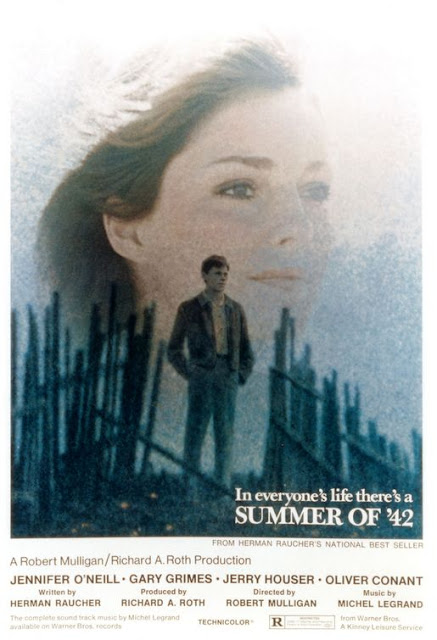Featuring one of the most lyrical love scenes in all of ’70s cinema, Summer of ’42 is an offbeat romance involving a teenage boy and a grown woman. Compassionately directed by Robert Mulligan, the film takes a bittersweet look at characters moving through profound life changes, conveying a sense of how deeply two people can comfort each other in times of need despite coming from different worlds. Screenwriter Herman Raucher, who adapted his original story into a novelization after completing the script—the book version eventually became a best-seller, just like the movie eventually became a sleeper hit—has said that the tale is autobiographical.
According to Raucher, he was a confused 15-year-old vacationing with his family on Nantucket Island during World War II, and he became friends with a beautiful woman named Dorothy and her husband, a U.S. soldier. After the soldier was summoned to active duty, young Raucher remained friendly with Dorothy. Then, one afternoon, young Raucher arrived at Dorothy’s house moments after she learned of her husband’s death in combat. Distraught and lonely, she took young Raucher to bed, and then departed the island the next day, leaving her adolescent lover only a note.
In the film version of this story, young Raucher is “Hermie” (Gary Grimes), a curious and kind-hearted teen spending the summer with his pals Benjie (Oliver Conant) and Oscy (Jerry Houser). Dorothy is portrayed by the mesmerizingly beautiful model-turned-actress Jennifer O’Neill. The teen high jinks that comprise much of the movie’s first half are forgettable, but all of the scenes with O’Neill have a certain magic. Not only does Mulligan guide O’Neill to a higher performance level than she ever reached in another project, but Mulligan captures the wonderment Hermie feels at connecting with a sophisticated adult. The entire movie has a nostalgic feel, with cinematographer Robert Surtees capturing the stark beauty of East Coast shorelines and composer Michel Legrand contributing tender melodies. Yet the appeal of the picture stems almost entirely from that one key scene—handled with unusual elegance and restraint, Hermie’s encounter with Dorothy is beautiful and bewildering and sad. The sequence is poetry.
Alas, the success of the movie compelled Raucher to write a thoroughly unnecessary sequel titled Class of ’44, which was produced and released two years after the original film. Neither director Mulligan nor costar O’Neill returned, though Grimes reprised his role as Hermie. (Conant and Houser return, as well, portraying Hermie’s pals, but they remain in supporting roles.) Set during Hermie’s college years—which are heavily fictionalized extrapolations of Raucher’s real-life experiences—the bland and meandering picture primarily concerns Hermie’s romance with Julie (Deborah Winters), a high-strung coed. Julie comes off as difficult and domineering, and Winters’ performance is strident, so it’s difficult to get excited about the prospect of these two forming a lasting bond.
Worse, Hermie emerges as a deeply ordinary collegiate who neither changes significantly during the course of the story nor has a major impact on those around him. Yes, he suffers a few coming-of-age blows, such as the death of his father, but these events feel trite compared with the transcendent experience Hermie had in Summer of ’42. The likeable Grimes does what he can with bland material, however, leavening the story’s inherent navel-gazing quality with admirable toughness. In sum, while the execution of Class of ’44 is more or less acceptable—particularly in terms of period details and production values—the whole enterprise feels perfunctory.
Summer of ’42: GROOVY
Class of ’44: FUNKY

